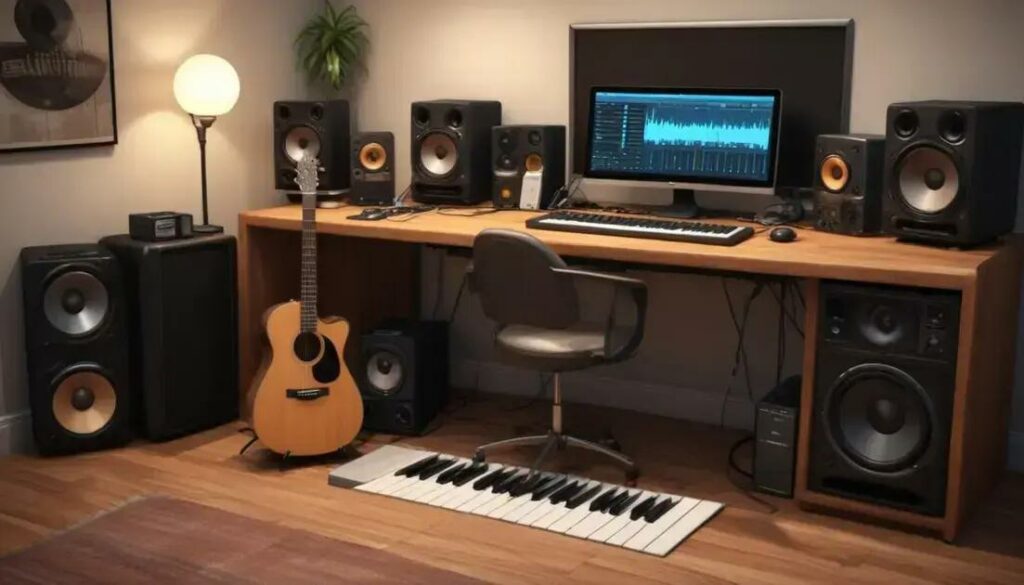Are you eager to dive into the world of Music Production? Whether you’re a novice or looking to polish your skills, this guide covers essential courses that can elevate your craft.
Introduction to Music Production
If you’re looking to dive into Music Production, you’re in for an exciting journey. Music production is about creating music. It involves recording, mixing, and mastering sound. Each step is important for making a great track.
First, let’s talk about recording. This is where you’ll capture sounds. You can record instruments, vocals, or even your own beats. You’ll need a good microphone and audio interface. These tools help ensure high-quality sound.
Next up is mixing. Mixing is where you blend all the sounds together. This process helps make every instrument and voice clear. You’ll adjust volume levels and add effects. It takes practice, but it’s crucial for a polished sound.
Finally, there’s mastering. This step makes your track ready for listening. It ensures your music sounds great on all devices. Mastering balances everything and adds a final touch. It’s like the cherry on top of your musical cake!
Each of these steps is key in music production. So, grab your gear and get started on your musical adventure!
Importance of Audio Recording
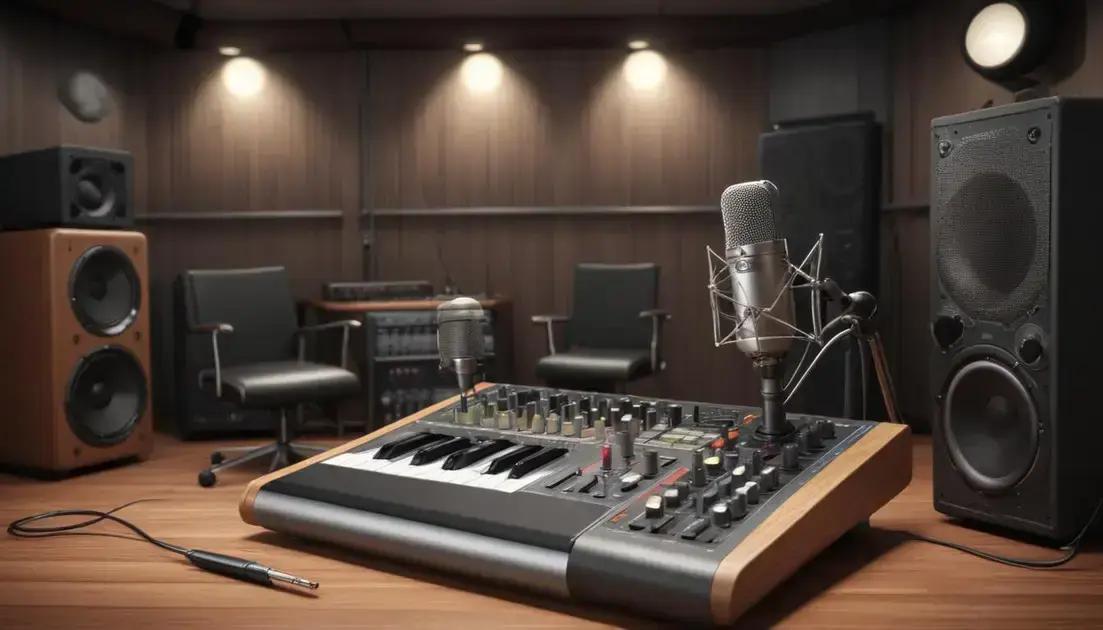
The importance of audio recording in music production can’t be overstated. It’s the first step in creating your track. Good recording lays the foundation for everything else.
Quality recordings capture the best sound. This is true for vocals, instruments, and even ambient sounds. Great recordings make a big difference in the final product.
Using the right equipment is key. You’ll need a decent microphone to get clear sound. An audio interface connects your microphone to your computer. This ensures high-quality recordings.
Positioning matters too. Place your microphone correctly to avoid unwanted noise. Experiment with different setups to find what works best for your sound.
Don’t forget about the environment. A quiet room with soft surfaces helps reduce echoes. This makes your recordings cleaner and more professional.
Ultimately, good audio recording is vital. It sets up your music for success. Invest time in learning how to record well, and you’ll notice the difference!
Basic Music Theory for Beginners
Understanding basic music theory is important for anyone starting in music production. It helps you know how music works. With a solid foundation in music theory, you can create better tracks.
First, learn about notes. Notes are the building blocks of music. Each note has a specific pitch. Familiarize yourself with the different notes on a keyboard or fretboard.
Next, explore scales. A scale is a set of notes played in order. The most common scale is the major scale. It sounds happy and bright. The minor scale is another key scale. It has a more somber tone.
Then, get to know chords. Chords are made by playing multiple notes together. They add depth to your music. Start with basic chords like major and minor. Play around with them to see how they sound.
Lastly, rhythm is key in music theory. It gives your music movement. Learn about beats and timing. Practicing with a metronome can help you keep a steady pace.
With these basics down, you’ll have a solid grasp of music. This knowledge can transform your music production skills!
Setting Up Your Recording Environment
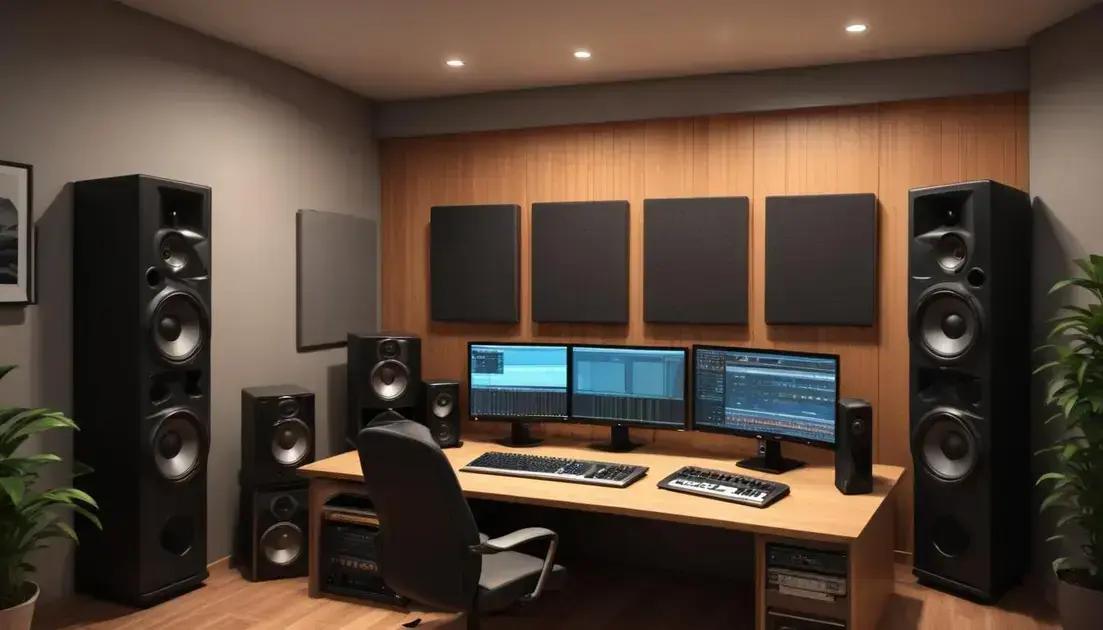
Setting up your recording environment is crucial for getting great sound. The right space can make a big difference in your music production. Start by choosing a quiet room where you won’t be disturbed.
Next, control the noise. Close windows and doors to minimize outside sounds. Carpets, curtains, and soft furniture can help absorb sound. This makes your recordings clearer and more professional.
Lighting is important too. A well-lit space can help you see your equipment clearly. Use natural light when possible, or get some bright lamps to brighten up the room.
Your equipment should be organized. Keep your microphone, audio interface, and headphones within reach. This will help you work smoothly without interruptions.
Consider using soundproofing materials if you can. Acoustic panels help reduce echo and improve sound quality. You can buy these or make your own using foam or cardboard.
Finally, set up your computer and digital audio workstation (DAW) software. Make sure everything is connected and working properly. Test your setup before you start recording to ensure everything sounds just right.
Choosing the Right Equipment
Choosing the right equipment is essential for successful music production. It can significantly impact your sound quality. Start with a good microphone. A quality mic captures vocals and instruments clearly. Consider a condenser mic for studio use.
Next, invest in an audio interface. This device connects your mic to your computer. It improves sound quality and reduces latency. Look for an interface with multiple inputs for versatility.
You’ll also need headphones. A good pair of studio headphones helps you hear every detail in your recordings. They should be comfortable for long sessions and provide accurate sound.
Don’t forget about monitors. Studio monitors give you a clear picture of your mix. They differ from regular speakers because they provide flat, accurate sound. This allows you to hear how your music really sounds.
Finally, consider your digital audio workstation (DAW). This software is where you’ll record and edit your music. Each DAW has unique features, so try a few before choosing one. Popular options include Ableton Live, Logic Pro, and FL Studio.
Remember, while it’s tempting to buy everything, start with the essentials. You can always expand your setup as you grow in your music production journey.
Understanding Software Options
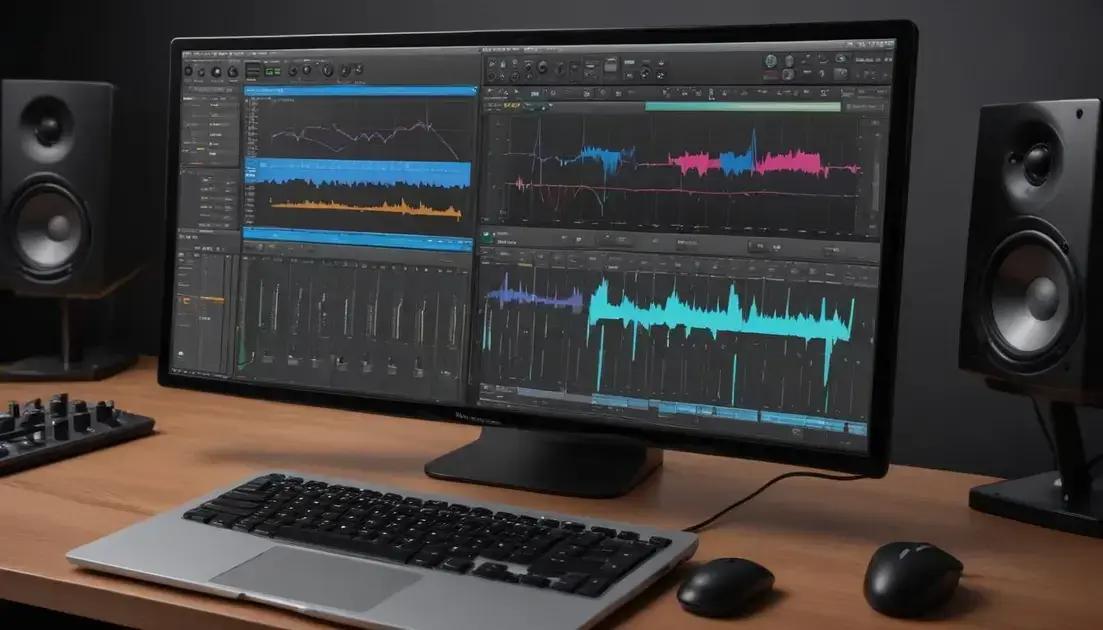
Understanding your software options is a big part of music production. The right software can make your work easier and more enjoyable. Most music producers use a Digital Audio Workstation (DAW). This is where you’ll record, edit, and mix your music.
There are many DAWs available. Some of the most popular ones are Ableton Live, Logic Pro, and FL Studio. Each has unique features and workflows. Try out a few to see which one feels right for you.
Ableton Live is great for live performances. It allows you to loop and mix tracks easily. Logic Pro is widely used by professionals, especially for its powerful editing tools. FL Studio is user-friendly and popular among beginners.
Another important software type is plugin software. Plugins add effects and instruments to your DAW. They can help you create unique sounds. Look for virtual instruments or effects that you find interesting.
You should also consider learning basic music notation software. Programs like MuseScore or Sibelius help you understand how to write music on paper. This knowledge enhances your production skills.
Take your time exploring different options. Find the software that suits your style and boosts your creativity.
Advanced Music Production Techniques
Once you’ve grasped the basics, it’s time to explore advanced music production techniques. These methods can elevate your music to the next level. One popular technique is layering. This involves combining multiple sounds to create a richer texture.
Try stacking different instruments in your mix. For example, combine a piano with a synth pad. This adds depth and makes your track more interesting. Don’t be afraid to experiment with various sounds!
Another technique is sidechain compression. This makes certain sounds pop by lowering the volume of one sound when another plays. It’s commonly used with kick drums and basses. This keeps your mix clean and prevents muddiness.
Automation is also crucial in advanced production. It allows you to change effects, volumes, and panning over time. For example, automate a reverb effect on a vocal track to create a sense of space.
Additionally, experimenting with different effects like distortion, delay, and chorus can spice up your sound. Each effect adds a unique character to your track.
Finally, consider mixing techniques like EQ and panning. These help you place sounds in the stereo field. This balance can transform your music and enhance the listener’s experience.
Real World Application in Music
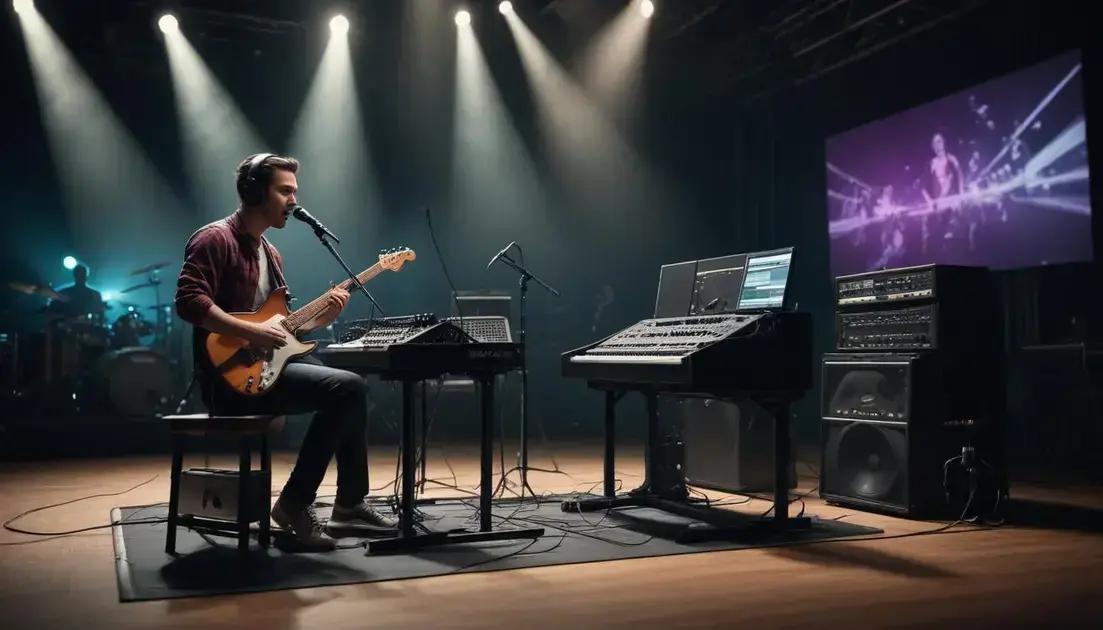
The real world application in music shows how important music production skills are today. Musicians and producers use these skills to create and share their art with the world. Every song you hear has gone through a production process.
In live performances, music production skills come into play. Artists use technology to enhance their shows. This includes using backing tracks, samples, and effects. These elements make live performances more thrilling and engaging.
Additionally, music producers work with artists to develop their sound. They help shape the music to fit the artist’s vision. This collaboration often results in unique and innovative tracks that stand out.
Moreover, music production extends to film and game soundtracks. Producers create scores that set the mood. A well-produced score can enhance the storytelling experience and make it more memorable.
Today, many artists also produce their own music. With technology widely available, anyone can create and share music from home. This has changed the music industry. It gives more artists a chance to be heard.
Overall, understanding music production allows artists to control their creative vision. They can reach audiences and express their ideas more freely than ever before.
Tips for Crafting Your First Track
When you’re ready to craft your first track, here are some helpful tips. Start by choosing a simple music genre that you enjoy. This makes the process more fun and keeps you motivated.
Next, lay down the basic beat. Use a drum machine or software to create a rhythm. A steady beat is the backbone of your track.
Once you have your beat, add some chords or a melody. Keep it simple and catchy. You don’t need to overcomplicate things at this stage.
After the basic elements, record your instruments or vocals. Use your microphone and audio interface to capture clean sounds. Experiment with different takes and see what you like best.
As you mix, pay attention to the balance of sounds. Adjust volumes and use panning to create space in your mix. This helps each element shine through.
Finally, don’t forget to add effects. Simple reverb or delay can give your track depth. Just don’t overdo it, as subtlety often works best.
Most importantly, have fun and be patient. Making music is a journey. Enjoy every step as you learn and improve!
Key Features of Popular Courses
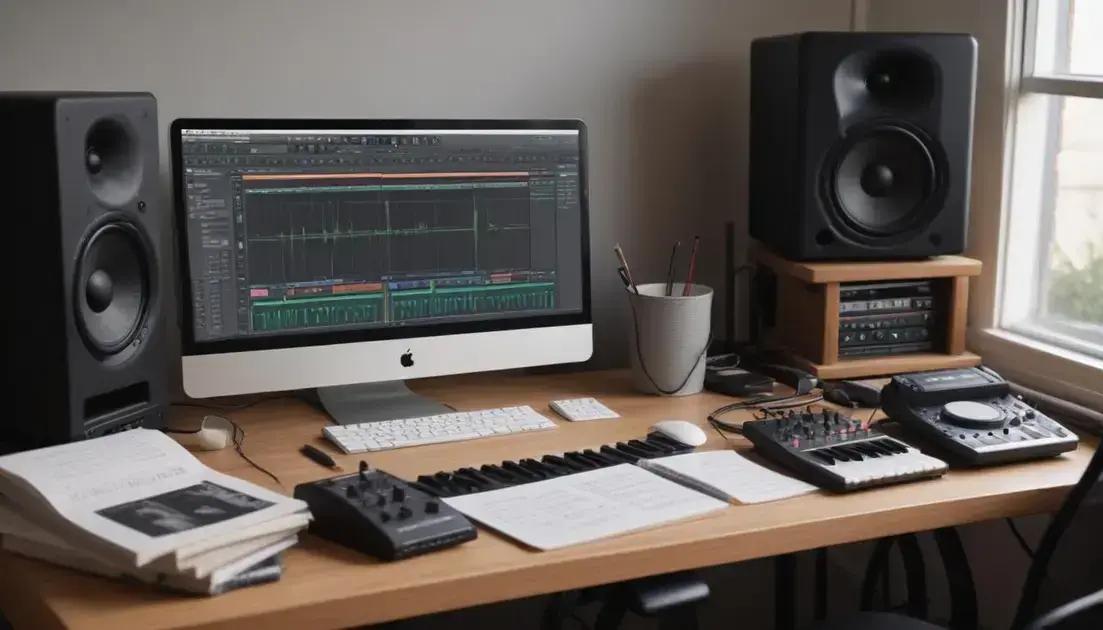
When exploring key features of popular courses in music production, several elements stand out. First, many courses offer hands-on projects. This lets students practice real-world skills while creating their own music.
Another important feature is access to video tutorials. These provide step-by-step guidance on using different software and techniques. This makes learning easier and helps you follow along at your own pace.
Many courses also include feedback from instructors. This personalized input can help you improve your skills significantly. You can ask questions and get tips tailored to your work.
Additionally, courses often have downloadable resources. These resources might include cheat sheets, instrument samples, and useful plugins that you can use in your projects.
Another great feature is community support. Many courses offer forums or groups where students can connect. This allows for sharing ideas, getting advice, and collaborating on projects.
Finally, flexible scheduling is a valuable aspect. Popular courses allow you to learn at your own pace. This makes it easier for you to fit learning into your daily life.
What You’ll Learn in Each Course
In music production courses, you’ll discover various key skills that help you create music. Each course typically covers the basics first. You’ll learn about music theory, which is essential for understanding how songs work.
Next, courses teach you how to use digital audio workstations (DAWs). This is where you’ll record, edit, and mix your tracks. Familiarity with a DAW is crucial for any music producer.
You will also explore different types of instruments and sounds. Many courses introduce you to virtual instruments and plugins. These tools expand your creative options and enhance your tracks.
A key part of learning is understanding mixing techniques. You’ll learn how to balance sounds, apply effects, and layer instruments for a polished sound.
Many courses also emphasize recording techniques. You’ll practice capturing vocals and instruments clearly. Proper recording techniques are pivotal for good sound quality.
Finally, you’ll gain insights into music production workflows. This covers everything from planning your project to finalizing your track for release. By the end of the course, you’ll be equipped with the skills needed to produce your own music.
Who These Courses Are For
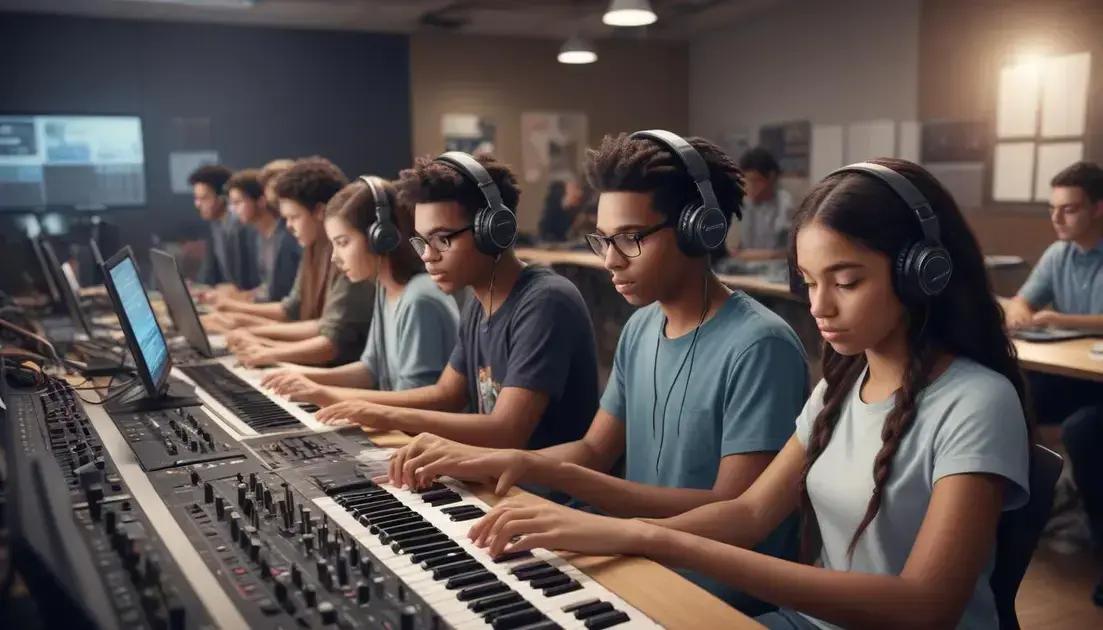
These music production courses are for anyone interested in creating music. If you’re a beginner, these courses will guide you through the basics. You don’t need any prior experience. Just a passion for music and a desire to learn.
Musicians looking to improve their skills will also benefit. If you’re an artist, knowing how to produce your tracks can help you stand out. This knowledge lets you take control of your sound.
Even those who work in related fields can find value. Producers, sound engineers, and DJs can deepen their knowledge through these courses. Expanding your skills can open new opportunities.
Anyone wanting to explore a career in music should consider these courses. Whether you dream of being a producer or working in a studio, these skills are essential. They can help you establish a strong foundation in the industry.
Finally, hobbyists who want to create music for fun will enjoy these courses. Learning to make music is a rewarding experience. You can create your own sounds for personal enjoyment or share them with others.
Common Requirements Across Courses
Common requirements across music production courses are generally straightforward and accessible. Most courses require you to have a computer. This is essential since you’ll be using software to create and edit music.
A good internet connection is also important. Many courses offer online tutorials and resources. Being connected allows you to download materials and participate in discussions.
You should have some basic knowledge of music. Understanding musical concepts like notes, chords, and rhythms can be helpful. However, many courses cover these basics as part of their curriculum.
Some courses may recommend specific software. Popular digital audio workstations (DAWs) like Ableton Live, Logic Pro, or FL Studio are often suggested. Check the course details to know what you need.
Additionally, having a basic microphone and headphones can enhance your learning experience. Good audio quality is important for recording and listening.
Lastly, a willingness to learn and experiment is crucial. Music production is a creative process, and being open to trying new things can make a big difference.
Conclusion and Next Steps
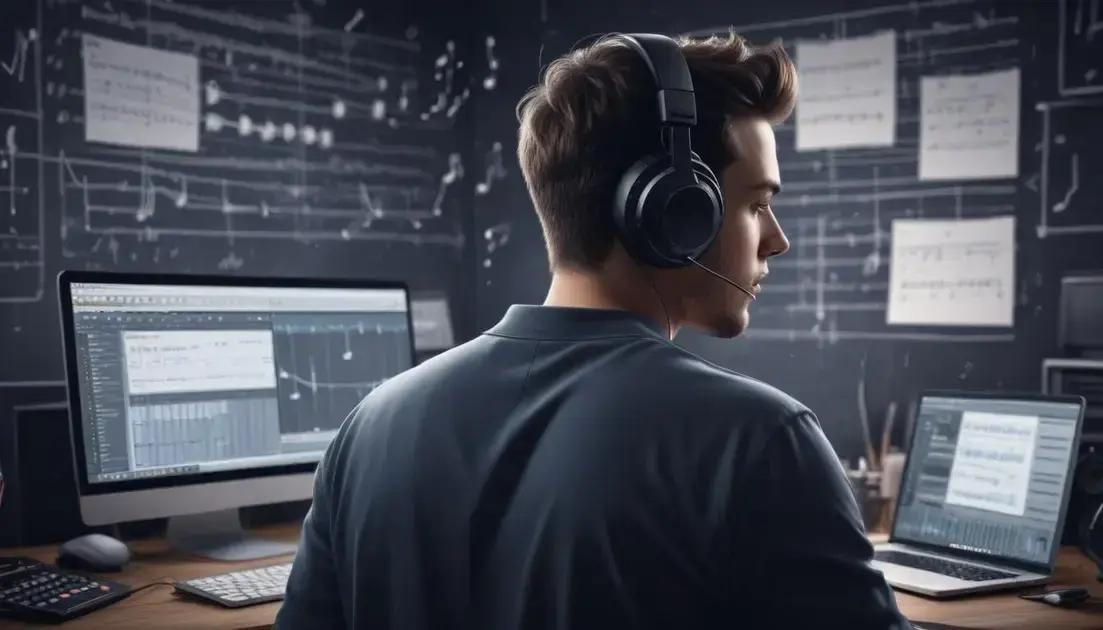
At this point, you should have a solid grasp of the music production process. Consider how you can apply this knowledge in your journey. Take the time to review what you’ve learned and make a plan for your next steps.
Start by practicing your skills regularly. The more you create, the more you’ll improve. Don’t hesitate to experiment with different styles and techniques.
Also, look for online communities where you can share your music. Getting feedback from others can help you grow as a producer. These communities often provide support and resources to enhance your learning.
If you’re considering taking a course, research your options. Find one that fits your learning style and goals. Many courses offer flexible schedules, so pick one that works for you.
Finally, remember to stay curious. The music production landscape is always changing. Keep exploring new tools, styles, and concepts to stay inspired.


